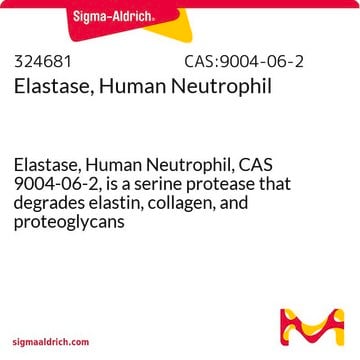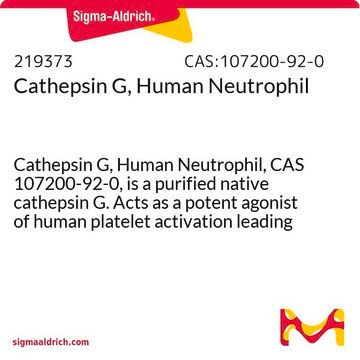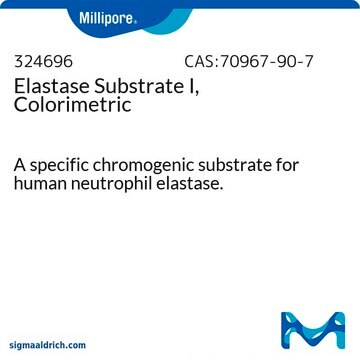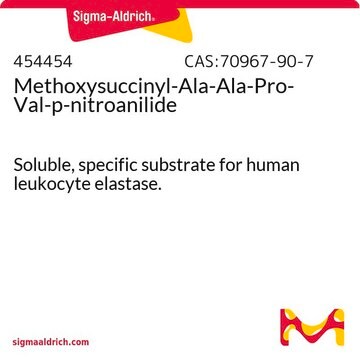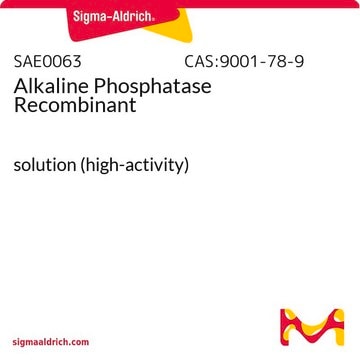C5108
Cathepsin G from human sputum
≥0.2 units/mg protein, salt-free, lyophilized powder
Sign Into View Organizational & Contract Pricing
All Photos(1)
About This Item
CAS Number:
MDL number:
UNSPSC Code:
12352200
NACRES:
NA.32
Recommended Products
biological source
human sputum
form
salt-free, lyophilized powder
specific activity
≥0.2 units/mg protein
UniProt accession no.
shipped in
wet ice
storage temp.
2-8°C
Gene Information
human ... CTSG(1511)
Biochem/physiol Actions
Cathepsin G has pro-apoptotic activity and can activate caspases in vitro.
Storage Class Code
13 - Non Combustible Solids
WGK
WGK 3
Flash Point(F)
Not applicable
Flash Point(C)
Not applicable
Choose from one of the most recent versions:
Already Own This Product?
Find documentation for the products that you have recently purchased in the Document Library.
E D Son et al.
Dermatology (Basel, Switzerland), 224(4), 352-360 (2012-07-05)
Cathepsin G, a serine protease that is activated by ultraviolet (UV) radiation, increases matrix metalloproteinase-1 (MMP-1) expression in fibroblasts through fibronectin (Fn) fragmentation and promotes the conversion of proMMP-1 to active MMP-1. This study investigated whether [2-[3-[[(1-benzoyl-4-piperidinyl)methylamino]carbonyl]-2-naphthalenyl]-1-(1-naphthalenyl)-2-oxoethyl]-phosphonic acid (KPA), a
Kathrin Steinwede et al.
Journal of immunology (Baltimore, Md. : 1950), 188(9), 4476-4487 (2012-03-31)
The neutrophil serine proteases cathepsin G (CG) and neutrophil elastase (NE) are involved in immune-regulatory processes and exert antibacterial activity against various pathogens. To date, their role and their therapeutic potential in pulmonary host defense against mycobacterial infections are poorly
Jeppe Thorlacius-Ussing et al.
Journal of cancer research and clinical oncology, 145(2), 383-392 (2018-11-24)
Elastin is a signature protein of lungs. Increased elastin turnover driven by altered proteolytic activity is an important part of lung tumorigenesis. Elastin-derived fragments have been shown to be pro-tumorigenic, however, little is known regarding the biomarker potential of such
Dieke van der Windt et al.
FEMS immunology and medical microbiology, 66(3), 445-448 (2012-09-05)
Although the Streptococcus pneumoniae polysaccharide capsule is an important virulence factor, ~ 15% of carriage isolates are nonencapsulated. Nonencapsulated S. pneumoniae are a cause of mucosal infections. Recent studies have shown that neutrophils kill S. pneumoniae predominately through neutrophil proteases, such as elastase
Jing Zhang et al.
Traffic (Copenhagen, Denmark), 13(5), 745-757 (2012-01-31)
Rabankyrin-5 (Rank-5) has been implicated as an effector of the small GTPase Rab5 and plays an important role in macropinocytosis. We have now identified Rank-5 as an interaction partner for the recycling regulatory protein, Eps15 homology domain 1 (EHD1). We
Our team of scientists has experience in all areas of research including Life Science, Material Science, Chemical Synthesis, Chromatography, Analytical and many others.
Contact Technical Service